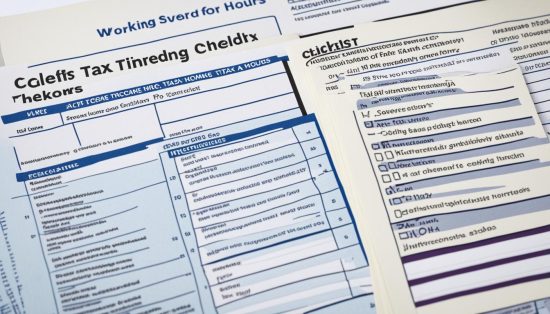Last Updated on: 6th May 2024, 05:18 am
Working Tax Credit is a government benefit in the United Kingdom that provides financial support to eligible workers and families. It is designed to boost the income of low-income individuals and households and provide additional financial assistance for childcare expenses.
Introduction to Working Tax Credit
Working Tax Credit is a means-tested benefit that offers financial support to individuals and families who are on a low income. It is aimed at providing assistance to those who are employed and have a certain number of working hours each week. The credit helps to supplement their income and alleviate financial strain.
For many individuals and families in the UK, making ends meet can be challenging, especially when the income is limited. That’s where Working Tax Credit comes in. This financial support program is designed to help those who are working but still need additional assistance to cover their living expenses.
With Working Tax Credit, eligible individuals and families can receive financial support that helps to bridge the gap between their income and necessary living costs. Whether it’s paying for rent, bills, or other essential expenses, this credit provides much-needed relief to those facing financial difficulties.
Eligibility for Working Tax Credit is based on a range of factors, including income, employment status, and the number of hours worked each week. By carefully assessing an applicant’s financial situation, the government ensures that those who truly need assistance receive the support they require.
It’s important to note that Working Tax Credit is a means-tested benefit, meaning it is specifically aimed at individuals and families with a low income. This ensures that the resources are allocated to those who need them most, offering a helping hand to those who may be struggling to make ends meet.
Next, we will explore what exactly Working Tax Credit is and the benefits it provides to eligible individuals and families. We’ll delve into the eligibility criteria and the application process, giving you a comprehensive understanding of this valuable financial support program.
What is a Working Tax Credit?
Working Tax Credit is a government benefit that provides financial assistance to individuals and families who are in employment but have a low income. It is designed to supplement their earnings and ensure that they have enough money to meet their basic needs.
Working Tax Credit is an essential component of the UK’s social support system, helping those who are employed but struggling financially to make ends meet. It offers a lifeline to individuals and families by providing additional income to alleviate financial pressures and improve their overall financial well-being.
How Does Working Tax Credit work?
Working Tax Credit operates on a means-tested basis, meaning that eligibility is determined by an individual or family’s income and circumstances. The credit is calculated based on various factors, including the number of hours worked, income, and marital status.
It is important to note that Working Tax Credit is not a standalone benefit. Instead, it works alongside other benefits, such as Child Tax Credit and Universal Credit, to provide comprehensive support to those in need.
Who is Eligible for Working Tax Credit?
To qualify for Working Tax Credit, individuals must meet certain eligibility criteria, including:
- Being employed or self-employed
- Earning a low income
- Working a minimum number of hours per week
- Being above the age of 16
Additionally, individuals must meet the residency requirements and have the right to reside in the UK.
The Benefits of Working Tax Credit
Working Tax Credit provides several benefits to individuals and families:
- Supplemental income: The credit offers additional financial support to boost the income of low-income workers, helping them meet their basic needs and improve their overall financial security.
- Childcare assistance: Working Tax Credit includes a childcare element, providing financial support to working parents to help cover the costs of childcare, making it more affordable for families.
- Savings on council tax: Eligible individuals and families may be entitled to a reduction in council tax through the Council Tax Reduction Scheme, further easing their financial burden.
These benefits aim to reduce financial strain and enhance the financial well-being of those who are eligible for Working Tax Credit.

| Working Tax Credit | Criteria |
|---|---|
| Eligibility | Employed or self-employed, low income, minimum hours of work |
| Supplemental income | Provides additional financial support to boost income |
| Childcare assistance | Offers financial support for childcare costs |
| Reduction in council tax | Potential savings on council tax through the Council Tax Reduction Scheme |
Eligibility Criteria for Working Tax Credit
To qualify for Working Tax Credit, individuals must meet certain criteria and eligibility requirements. These requirements are in place to ensure that the credit is given to those who truly need it and meet the necessary qualifications.
- Receiving Child Tax Credit: To be eligible for Working Tax Credit, individuals must already be receiving Child Tax Credit. This requirement emphasizes the support provided to families with children and ensures that both credits work harmoniously together.
- Age and Employment Status: Eligibility for Working Tax Credit is determined by age and employment status. The credit is available for individuals who are at least 16 years old. They must also be employed or self-employed, actively working towards generating income that they can supplement with the tax credit.
- Working Hours: The number of hours worked each week is another crucial factor in determining eligibility for Working Tax Credit. Individuals must meet the minimum working hour requirements, which vary depending on their age and circumstances. These requirements are set to ensure that the credit supports those who are working and contributing to the economy.
- Income Limits: Income limits are an essential aspect of the eligibility criteria for Working Tax Credit. The amount of credit an individual or household can receive is directly influenced by their income. The income limits are set to ensure that the credit is targeted towards those with lower incomes who may struggle to make ends meet without financial assistance.
These eligibility criteria and qualifications are designed to ensure that Working Tax Credit reaches those who need it the most. By meeting these requirements, individuals can access the financial support they require to improve their financial situation and alleviate some of the burdens of living on a low income.

How to Apply for Working Tax Credit
Applying for Working Tax Credit is a straightforward process that can be done online or by phone. To ensure a smooth application, follow these steps:
Step 1: Gather the Necessary Information
Before starting the application process, gather the relevant information about your employment, income, and family circumstances. This may include:
- Details of your employment, such as employer name and address
- Information about your income, including recent payslips or self-assessment tax return
- Proof of your identity and address
- Details about your partner, if applicable
- Information about any children or dependents
Step 2: Complete the Online Application
To apply online, visit the government website and locate the working tax credit application page. Fill in all the required fields, providing accurate and up-to-date information. Double-check your responses to ensure accuracy.
Throughout the application, you may be asked to provide additional supporting documents. Make sure to have digital copies of these documents ready, as you may be required to upload them during the application process.
Ensure that you fully understand each question before answering. If you are unsure about any specific information, seek guidance from the provided helpline or consult the application guidance notes.
It is important to note that the online application can be saved and completed at a later time if needed. Take advantage of this feature if you require additional time to gather the necessary documents or review the application.
Step 3: Application Assessment
After submitting your application, it will be assessed by HM Revenue and Customs (HMRC). They will review the information provided and determine your eligibility for Working Tax Credit.
The assessment process may take some time, so it is essential to be patient. You may also be contacted by HMRC if additional information or clarification is required.
Once the assessment is complete, you will receive a decision regarding your Working Tax Credit application. This decision will outline the amount of credit you are eligible to receive.
Keep in mind that applications can be reviewed and reassessed periodically, so it is important to inform HMRC of any changes in your circumstances that may affect your eligibility or the amount of credit you receive.

| Online Application | Application Helpline | |
|---|---|---|
| Accessibility | Accessible 24/7 from any location with internet access | Available during office hours on weekdays |
| Convenience | Complete the application at your own pace, save and resume later | Immediate assistance from knowledgeable staff |
| Documentation | Upload supporting documents electronically | Mail or fax supporting documents |
| Response Time | Application process time varies | Immediate response or escalation if required |
Can I Get Help With Childcare Through Working Tax Credit?
If you’re a working parent in the UK, you may be eligible for childcare assistance through Working Tax Credit. This financial support is designed to alleviate the burden of childcare costs and make it more affordable for families.
The childcare element of Working Tax Credit provides assistance to individuals and families who require help with their childcare expenses. Whether you need help with nursery fees, after-school clubs, or childcare during school holidays, this element of the credit can provide the necessary financial support.
By claiming the childcare element of Working Tax Credit, you can receive financial assistance to cover a portion of your childcare costs. This can make a significant difference in ensuring that you can continue working while providing quality care for your children.
It’s important to note that eligibility requirements for the childcare element of Working Tax Credit apply. To qualify for this financial support, you must meet certain criteria related to your income, working hours, and child’s age. The amount of assistance you receive will vary based on these factors.
Applying for childcare assistance through Working Tax Credit is relatively straightforward. You can complete the application online or by calling the relevant helpline. Make sure to provide accurate information about your income, employment, and childcare expenses to ensure a smooth application process.
Once you’ve submitted your application, it will be assessed by HM Revenue and Customs (HMRC). If you meet the eligibility requirements, you will start receiving the childcare assistance as part of your Working Tax Credit.
The Benefits of Childcare Assistance through Working Tax Credit
By accessing childcare assistance through Working Tax Credit, you can experience a range of benefits. These include:
- Reduced financial strain: Childcare costs can be a significant expense for working parents. By receiving financial support through Working Tax Credit, you can lighten the financial burden and have more disposable income.
- Access to quality childcare: With financial assistance, you can choose a childcare provider that meets your needs, ensuring that your child receives quality care and education.
- Flexibility in employment: By having access to affordable childcare, you can continue working or increase your working hours without worrying about the costs and availability of childcare.
- Peace of mind: Knowing that you have financial support for childcare expenses can provide peace of mind and alleviate stress in managing your family’s finances.
Childcare Assistance through Working Tax Credit: A Real-Life Example
Let’s consider a hypothetical example of how Working Tax Credit’s childcare assistance can make a difference in a family’s life:
| Family | Annual Income | Childcare Costs | Childcare Assistance Received |
|---|---|---|---|
| Smith Family | £20,000 | £300 per month (£3,600 per year) | £2,400 per year |
In this example, the Smith family has an annual income of £20,000 and incurs childcare costs of £300 per month. Through the childcare element of Working Tax Credit, they receive £2,400 per year in financial assistance.
As a result, the Smith family’s out-of-pocket expenses for childcare are reduced to £1,200 per year, making it more affordable for them to access high-quality care for their child while maintaining their employment.
It’s important to note that the figures used in this example are hypothetical and may not reflect the exact amounts parents receive in reality. The amount of childcare assistance received through Working Tax Credit will depend on various factors, including income, childcare costs, and eligibility criteria.

Whether you’re a single parent or part of a working couple, childcare assistance through Working Tax Credit can provide invaluable financial support, allowing you to balance work and family responsibilities. By understanding the eligibility requirements and application process, you can access the help you need to make childcare more affordable and accessible.
How Much Working Tax Credit Will I Get?
The amount of Working Tax Credit you will receive is determined by several factors, including your income, family circumstances, and the number of hours you work each week. The UK government has set income limits that help determine the maximum amount of credit you are eligible to receive.
The Working Tax Credit Amount
The working tax credit amount you receive is calculated based on your income. The more you earn, the lower your credit amount will be. This is because the credit is designed to provide financial assistance to individuals and families with lower incomes.
Income Limits
To be eligible for Working Tax Credit, your income must fall within certain limits. This ensures that those who truly need financial assistance receive the credit. The income limits vary depending on your circumstances, such as whether you are single, in a relationship, or have children.
Eligibility
Eligibility for Working Tax Credit is determined by factors such as your income, employment status, and the hours you work each week. To qualify, you must meet certain criteria and provide supporting documentation to prove your eligibility.
| Household Income | Maximum Working Tax Credit Amount |
|---|---|
| Up to £6,000 per year | £3,485 |
| Up to £10,000 per year | £2,555 |
| Up to £15,000 per year | £1,625 |
| Up to £20,000 per year | £795 |
These income limits are subject to change and may be affected by factors such as the number of children you have and whether you have a disability. It is important to check the latest guidelines and consult with HM Revenue and Customs (HMRC) for the most accurate information regarding the working tax credit amount you may be eligible to receive.
How Do You Claim a Working Tax Credit?
To claim Working Tax Credit, individuals need to complete an application form and provide supporting documentation to prove their eligibility. This can include proof of income, employment details, and information about their family circumstances. The application will then be assessed by HMRC.
Applying for Working Tax Credit is a straightforward process that involves the following steps:
1. Gather the Necessary Documentation
Before starting the application, make sure to gather all the required documentation. This can include:
- Proof of income: Payslips, bank statements, or any other official documents that demonstrate your income.
- Employment details: Information about your employer, including their name, address, and contact information.
- Details about your family circumstances: This may include the number of children you have, their ages, or any disabilities they may have.
Having these documents prepared beforehand will help ensure a smooth and hassle-free application process.
2. Complete the Application Form
Once you have gathered all the necessary documentation, you can proceed to complete the Working Tax Credit application form. This can be done online through the government’s official website or by requesting a physical copy of the application form and submitting it by mail.
The application form will ask for personal information, employment details, income information, and other relevant details about your family circumstances. Fill in all the required fields accurately and double-check the information before submitting the form.
3. Submit the Supporting Documentation
Along with the completed application form, you will need to submit the supporting documentation to prove your eligibility for Working Tax Credit. Make sure to include all the necessary documents and ensure they are clear and legible. Keep copies of the documents for your records.
4. Assessment by HMRC
Once you have submitted your application and supporting documentation, it will be assessed by HMRC. The assessment process may take some time, and HMRC may request additional information or clarification if needed.
It is important to provide accurate and truthful information in your application and respond promptly to any requests from HMRC. This will help ensure a smooth assessment process and avoid any delays in receiving your Working Tax Credit.
Once your application has been assessed, HMRC will notify you of the outcome. If approved, you will start receiving your Working Tax Credit payments. If your application is unsuccessful, you may have the option to appeal the decision or seek further clarification from HMRC.
| Step | Description |
|---|---|
| Gather the necessary documentation | Collect proof of income, employment details, and information about your family circumstances. |
| Complete the application form | Fill in the Working Tax Credit application form accurately and provide all the required information. |
| Submit the supporting documentation | Include the necessary documents to prove your eligibility along with the application form. |
| Assessment by HMRC | HMRC will review your application and supporting documentation to determine your eligibility. |
Claiming Working Tax Credit is an important step towards accessing financial support and assistance. By following the application process and providing the necessary documentation, eligible individuals can benefit from this valuable government initiative.
How Do You Challenge a Working Tax Credit Decision?
If you find yourself in a situation where you disagree with a decision made by HMRC regarding your Working Tax Credit claim, it is important to know that you have the right to challenge it. Challenging a decision can be a challenging process, but it is essential to take the necessary steps to ensure that you receive the benefits and support you are entitled to.
To challenge a Working Tax Credit decision, you will need to submit an appeal to HMRC. This process involves providing additional information or evidence to support your case. It is crucial to gather any relevant documents or records that can help strengthen your argument.
When submitting an appeal, it is essential to clearly outline the reasons why you believe the decision was incorrect. Providing specific details and examples can strengthen your case and improve your chances of a successful appeal.
Once your appeal has been submitted, HMRC will review the additional information provided and reconsider their decision. It’s important to note that this review process can take time, so it is essential to be patient throughout the process.
During the review process, HMRC may contact you for additional information or clarification. It is crucial to respond promptly to any requests to ensure a smooth and efficient resolution to your appeal.
Seeking professional advice
If you are uncertain about how to proceed with challenging a Working Tax Credit decision, it may be helpful to seek professional advice. There are organizations and services available that specialize in providing support and guidance in navigating the appeal process.
These professionals can assist you in understanding the specific requirements and procedures for appealing a Working Tax Credit decision. They can also offer valuable insights and advice on how to present your case effectively, increasing your chances of a successful outcome.
Benefits and Calculations of Working Tax Credit
Working Tax Credit offers a range of benefits to eligible individuals and families, providing essential financial support that can make a significant difference in their lives. One of the primary benefits of Working Tax Credit is the supplemental income it provides. This additional financial support helps individuals and families on low incomes meet their daily expenses, such as rent, bills, and groceries.
Another significant benefit of Working Tax Credit is the assistance it offers with childcare costs. Many working parents struggle to afford the high expenses associated with childcare. However, with Working Tax Credit, eligible individuals can receive financial support that helps ease the financial burden of childcare, making it more affordable for them to continue their employment.
Working Tax Credit also includes additional support for disabled individuals. This support can help cover extra costs associated with disabilities, such as medical expenses and necessary equipment. It ensures that disabled individuals receive the financial assistance they need to lead fulfilling and independent lives.
Calculating the amount of Working Tax Credit an individual or family is entitled to involves considering several factors. The income of the applicant, including wages, self-employment income, and other sources, is taken into account. Family circumstances, such as the number of children and whether the applicant has a partner, are also considered. Additionally, the number of hours worked each week plays a role in determining the credit amount.
Working Tax Credit enables eligible individuals and families to access vital financial support that helps improve their quality of life. Whether it’s through supplemental income, assistance with childcare costs, or support for disabled individuals, Working Tax Credit plays a crucial role in providing the necessary financial resources to those who need it most.
It’s important for individuals to understand the benefits they are entitled to and how the calculations are made. By being aware of the available support, individuals can take full advantage of Working Tax Credit and ensure they receive the financial assistance they need to thrive.
| Benefit | Description |
|---|---|
| Supplemental Income | Provides additional financial support for low-income individuals and families to meet daily expenses |
| Assistance with Childcare Costs | Helps alleviate the financial burden of childcare expenses, making it more affordable |
| Support for Disabled Individuals | Covers extra costs associated with disabilities, such as medical expenses and necessary equipment |
Common Misconceptions about Working Tax Credit
Despite its benefits, there are several common misconceptions surrounding Working Tax Credit. Let’s address these misconceptions and provide accurate information:
Myth 1: Working Tax Credit needs to be paid back
False information has led some to believe that they need to repay their Working Tax Credit in the future. However, this is not the case. Working Tax Credit is a government benefit designed to provide financial support to eligible workers and families. It is not a loan and does not need to be paid back.
Myth 2: I earn too much to qualify for Working Tax Credit
Another misconception is that individuals believe they earn too much to be eligible for Working Tax Credit. However, the eligibility criteria are based on income limits and other factors. As long as you meet the requirements and meet the income thresholds, you may be eligible for Working Tax Credit, regardless of your income level.
It is crucial to dispel these misconceptions and ensure that accurate information about the eligibility criteria and benefits of Working Tax Credit reaches those who could benefit from this valuable government initiative. The goal is to provide financial support to individuals and families who need it most, and debunking these misconceptions will help more people access this important assistance.
Conclusion
The Working Tax Credit program in the UK serves as a valuable source of financial assistance for low-income individuals and families. Through this initiative, eligible individuals can receive supplemental income, childcare assistance, and support for disabled individuals. By understanding the eligibility criteria and application process, those in need can access the financial help they deserve.
Working Tax Credit plays a crucial role in alleviating the financial burden faced by many individuals and families across the country. It provides much-needed financial assistance to those who may be struggling to make ends meet. Whether it is through the extra income, help with childcare costs, or support for disabled individuals, this program is designed to offer comprehensive financial relief.
For those seeking financial assistance, Working Tax Credit provides a lifeline to help improve their quality of life. By familiarizing themselves with the eligibility requirements and applying for this valuable government initiative, individuals can access the support they need to better their financial circumstances.
FAQ
1. Who is entitled to Working Tax Credit?
Individuals and families who are on a low income and meet the eligibility criteria can be entitled to Working Tax Credit.
2. How much do you have to earn to get tax credits?
The income threshold for Working Tax Credit depends on various factors, including family circumstances and the number of hours worked each week. There are income limits in place to determine eligibility.
3. What is the difference between tax credits and Universal Credit?
Tax credits and Universal Credit are both government benefits, but they have different eligibility criteria and application processes. Universal Credit is replacing most of the existing benefits, including tax credits, in the UK.
4. Do you have to pay Working Tax Credit back?
No, Working Tax Credit does not need to be paid back. It is a government benefit designed to provide financial support to eligible individuals and families.
5. Do I earn too much for Working Tax Credit?
The eligibility for Working Tax Credit depends on various factors, including income limits. It is best to check the specific income thresholds to determine if you meet the criteria for the credit.
6. Can you claim Working Tax Credit if you have savings?
The amount of savings you have can affect your eligibility for Working Tax Credit. It is important to check the income limits and eligibility criteria to determine if you can claim the credit.
7. How much money can you have in the bank and still claim benefits?
The amount of money you can have in the bank and still claim benefits varies depending on the specific benefit and your individual circumstances. It is best to check with the relevant government department for accurate information.
8. Can DWP check my bank account?
Yes, the Department for Work and Pensions (DWP) has the legal right to check your bank account as part of the benefit assessment process. This is done to ensure that the information provided is accurate and to prevent fraud.
9. What counts as disabled for Working Tax Credit?
To qualify for the disability element of Working Tax Credit, individuals must meet specific criteria related to their disability or health condition. This can include being in receipt of certain disability benefits or meeting certain disability-related requirements.
10. Will my tax credits go up if I get PIP?
If you start receiving Personal Independence Payment (PIP), it may affect the amount of Working Tax Credit you receive. It is important to inform HM Revenue and Customs (HMRC) promptly to ensure that your benefit entitlement is correctly assessed.




















No Comments
Leave a comment Cancel